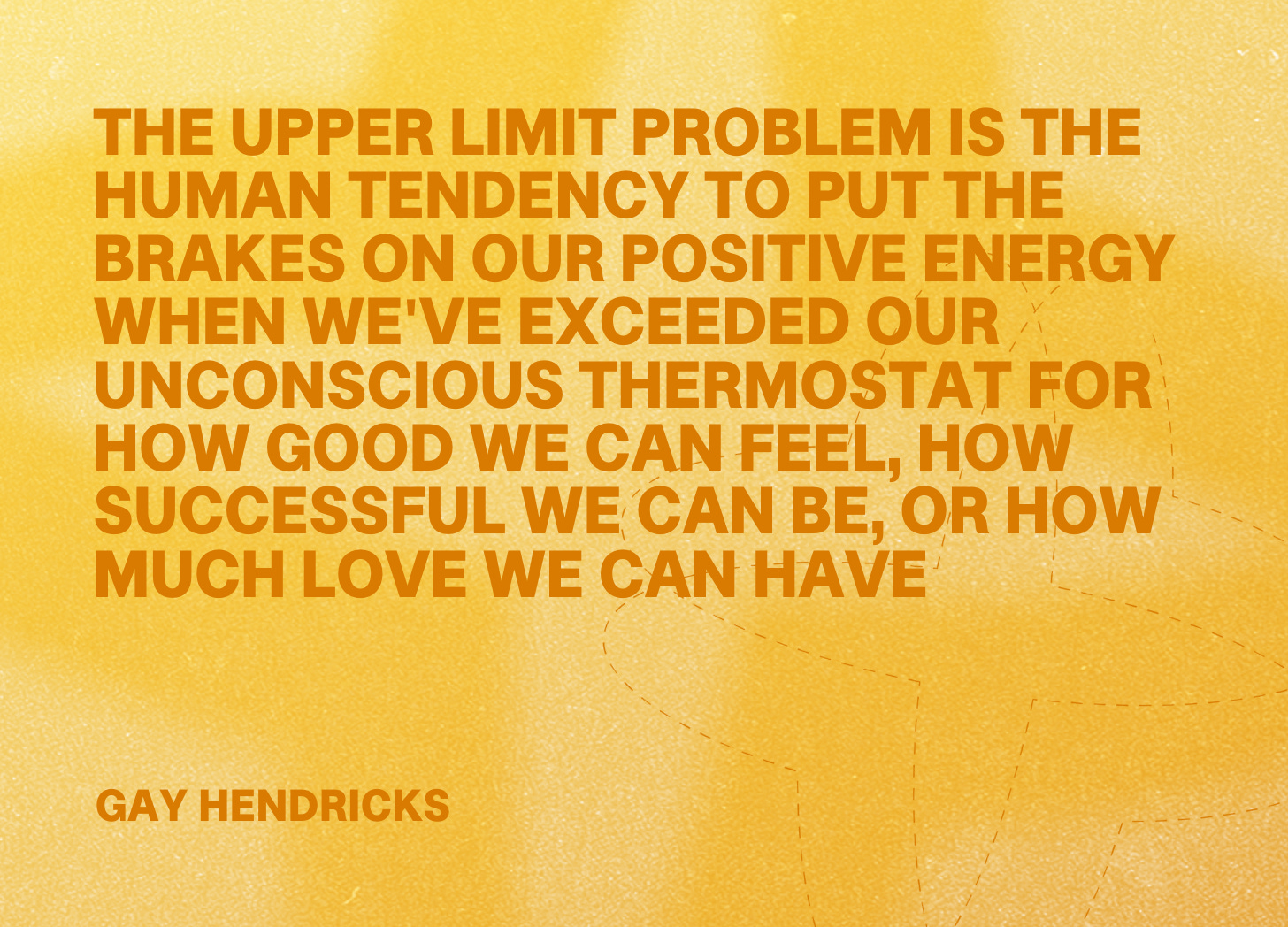Helen had been working toward her dream job for three years. When she finally got the interview, she was perfectly prepared. The conversation went brilliantly. The hiring manager practically offered her the position on the spot.
Then something strange happened.
On the way home, Sarah started obsessing over every word she'd said. By evening, she'd convinced herself she'd been "too pushy" and "came across as arrogant." She spent the weekend in anxiety spirals, then sent a follow-up email that was so apologetic and self-deprecating that it nearly cost her the job.
Sarah had just experienced what psychologists call "upper limiting" - the unconscious sabotage that happens when good things exceed our internal thermostat for what we believe we deserve.
Sound familiar?
Maybe you've done this too:
Started a fight with your partner right before a romantic getaway
Gotten sick before an important presentation
Made a costly "mistake" just as your business was taking off
Ended a relationship right when it was getting serious
Binged, overspent, or acted out right after a major achievement
It’s easy to put this down to willpower or bad luck. But actually, this is your shadow at work.
The success shadow: What gets buried when you're "too much"
Your success shadow formed early, through messages that taught you that shining, succeeding, or being powerful wasn't safe:
Direct Messages:
"Don't get too big for your britches"
"Pride comes before a fall"
"Who do you think you are?"
"Don't show off"
"Stay humble"
Indirect Messages:
Watching a parent get criticised for their success
Being punished for outperforming siblings
Learning that being "special" made others uncomfortable
Experiencing jealousy or resentment when you achieve something
Cultural Messages:
"Good girls don't brag"
"Real men don't need recognition"
"Money is the root of all evil"
"Suffering is noble, success is suspect"
You learned that being too successful, happy, or powerful was dangerous to your belonging.
So parts of you went into hiding:
Your natural confidence became buried under false humility
Your ambition was labelled as "selfish"
Your joy in achievement became "showing off"
Your desire for recognition became "needy"
These disowned parts didn't disappear. They became the “success shadow”; the parts of you that believe you don't deserve good things and will sabotage them to keep you "safe."
The four types of success self-sabotage
1. The guilt saboteur: "I don't deserve this"
This part believes that having good things makes you selfish or means you're taking from others. It shows up as:
Downplaying your achievements
Feeling guilty about success while others struggle
Giving away your power or money to "balance the scales"
Imposter syndrome that convinces you you're fooling everyone
Shadow message: "If I succeed, I'm abandoning my family/community/values."
2. The fear saboteur: "Success isn't safe"
This part learned that visibility and success make you a target. It shows up as:
Getting sick or having accidents before big moments
Creating chaos or drama to distract from success
Choosing self-destructive behaviours when things go well
Avoiding opportunities that would make you stand out
Shadow message: "If I succeed, I'll be attacked, rejected, or abandoned."
3. The loyalty saboteur: "Success means betrayal"
This part believes that outgrowing your origins means abandoning the people you love. It shows up as:
Feeling guilty about having more than your family
Dumbing yourself down to fit in
Choosing partners or friends who keep you small
Self-sabotage to stay at the same level as others
Shadow message: "If I succeed, I'll lose my people."
4. The identity saboteur: "I don't know who I am if I'm not struggling"
This part has built an identity around overcoming obstacles and doesn't know how to exist without problems. It shows up as:
Creating drama when life gets too peaceful
Feeling uncomfortable with ease and flow
Missing the intensity of struggle and crisis
Not knowing how to receive good things without earning them through suffering
Shadow message: "If I'm not struggling, I'm not me."
"Your success shadow will always try to return you to your comfort zone - even when that zone is uncomfortable."
The physiology of upper limiting
Upper limiting isn't just psychological - it's physiological. When good things exceed your nervous system's set point for safety, your body literally activates stress responses:
Physical symptoms of upper limiting:
Sudden illness or fatigue when things go well
Anxiety or panic about good news
Insomnia when you should be celebrating
Digestive issues during positive changes
Accidents or injuries at peak moments
Mental symptoms:
Obsessive worry about losing what you've gained
Catastrophic thinking about future problems
Inability to enjoy present success
Compulsive planning for worst-case scenarios
Your nervous system doesn't distinguish between stress from bad things and stress from exceeding your comfort zone for good things.
Working with your success shadow
1. Recognise your upper limit patterns
Start tracking when and how you self-sabotage:
What types of success trigger your sabotage?
What physical sensations arise when things go well?
What stories does your mind tell you about why you don't deserve good things?
How do you typically sabotage (conflict, illness, "mistakes," etc.)?
2. Meet your success shadow parts
When you notice self-sabotage starting, pause and ask:
"What part of me is afraid of this success?"
"What is this part trying to protect me from?"
"How old does this part feel?"
"What does this part need to feel safe with success?"
3. Expand your tolerance for good things gradually
Like physical exercise, you need to increase your capacity for success gradually:
Practice receiving compliments without deflecting
Allow yourself small celebrations without apologising
Notice when you feel "too good" and breathe through it
Increase your tolerance for positive attention incrementally
4. Reframe success as service
Many people can handle success better when they see it as service rather than selfishness:
"My success allows me to help others"
"My visibility gives others permission to shine"
"My achievements honour the people who believed in me"
"My prosperity allows me to be more generous"
The world doesn't need you to be small. The world needs you to be who you came here to be.
Your success shadow practice
Daily practice: The success tolerance check-in
Each morning, ask yourself:
"How much success am I willing to have today?"
"Where do I feel resistance to good things?"
"What would I do if I knew I deserved it?"
Weekly practice: The upper limit review
Each week, notice:
Where did I sabotage myself when things were going well?
What physical sensations arose when I succeeded?
How did I deflect, minimise, or apologise for good things?
What would it look like to fully receive this week's wins?
Monthly practice: Expanding your success thermostat
Each month, consciously choose to:
Accept a compliment fully without deflecting
Celebrate an achievement without minimising it
Receive help or gifts without feeling guilty
Take up more space in one area of your life
When your success threatens others
Sometimes your upper limiting isn't just internal. It can be a response to real external pressure. Family members, friends, or colleagues might be threatened by your success and try to pull you back down.
Signs that your success triggers others:
Increased criticism or judgment when you succeed
Comments designed to diminish your achievements
Withdrawal of support or affection during your wins
Attempts to create drama or crisis during your peak moments
Your job is not to dim your light so others feel comfortable. When you shine, you permit others to do the same.
In these situations, you need both shadow work AND boundary work. You can acknowledge your internal upper limiting patterns while also protecting yourself from others' projections.
The gift of your success shadow
Here's what your success shadow wants you to understand:
I'm not trying to ruin your life or keep you small. I'm trying to protect you from the pain of rejection, criticism, and abandonment. I learned early that being too successful, happy, or powerful was dangerous. I've been working overtime to keep you safe by keeping you small. But I would be grateful if you could show me that success can be safe now. I need evidence that you can handle visibility, prosperity, and power without losing love. Help me learn new ways to keep you safe that don't require sacrificing your dreams.
Integration: From self-sabotage to sustainable success
Our goal in shadow work is to transform your success shadow from a saboteur into an ally that helps you succeed sustainably.
Healthy success includes:
Celebrating achievements without guilt
Receiving recognition without deflecting
Maintaining relationships while growing
Using success to serve others
Staying grounded while expanding
True success is not about getting everything you want - it's about becoming someone who can handle having everything you want.
Your success shadow holds has held a lot of fear, but it also hold gifts; the humility that keeps you connected, the awareness that prevents arrogance, the sensitivity that helps you lift others as you rise.
The work is learning to expand your capacity for good things while honouring the parts of you that have been trying to keep you safe.
You don't have to choose between success and safety, achievement and belonging, prosperity and love.
You can have it all when you're willing to expand your internal thermostat to be able to tolerate as much goodness as you can handle.
The world needs your gifts. Your success shadow has been protecting you from sharing them.
It's time to let yourself shine.
Key Takeaways:
Self-sabotage when things go well is usually shadow work, not character flaws
Your success shadow formed to protect you from the perceived dangers of being "too much"
Upper limiting has both psychological and physiological components
You can gradually expand your tolerance for success and good things
Your success shadow wants to protect you, not limit you - it just needs updating
Next Steps:
Track your upper limiting patterns for one week
Identify which type of success saboteur is most active in your life
Practice receiving one good thing each day without deflecting
Consider whether external pressure is reinforcing your internal patterns
Your success isn't selfish. Your light isn't too much. Your gifts aren't a burden.




There’s some fierce journaling for me to do after reading this. I’m undoubtedly a fear based saboteur- it’s been a few years since I pushed that button. But the fall out from the last time I did it did teach me the lesson.